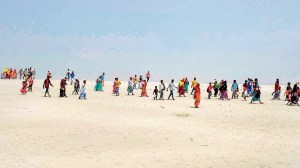- India
- International
Villages along Indo-Bhutan border have no basic amenities: Bodo students
In Chirang, most villages along the Indo-Bhutan boundary do not have road access to the outside world.
The All Bodo Students’ Union (ABSU) which organised a 22-day march through Chirang district in western Assam, said that the villages along the Indo-Bhutan border have no basic amenities like healthcare, drinking water and electricity, and roads are all practically non-existent.
“While 85 per cent of the people live below poverty line, illiteracy and lack of safe drinking water has made life hell in dozens of villages that we toured in three weeks. Moreover, witchcraft, black magic and proliferation of small arms have further complicated lives of the poo tribals,” said Phanin Boro, president of the Chirang district unit of ABSU.
The ABSU, which flagged off its first phase of “long march” on October 2 in Chirang, groups of student volunteers would march through three other Bodoland districts – Baksa, Kokrajhar and Udalguri – in the next eight to ten weeks. “We often talk about backwardness, poverty, illiteracy and diseases in our villages based on newspaper reports and stray allegations. But this long march has not only opened our eyes through first-hand experience but also helped us understand how thousands of poor tribals are suffering due to ignorance and lack of a voice,” said ABSU central committee president Pramod Boro. The ABU will come out with a detailed report of their findings after covering all the four districts.
In Chirang, most villages along the Indo-Bhutan boundary do not have road access to the outside world, with Khanindra Basumatary, general secretary of the ABSU’s Chirang unit saying people have to wade across rivers and streams to travel to the nearest road. “The village in which Priya Basumatary, a Class X student was brutally killed in full view of her parents and fellow villagers in August, for instance can be reached only after crossing two rivers,” Basumatary said.
“Most people drink water from rivers, streams and nullahs. Only a handful of slightly better-off families have hand pumps. This water-borne diseases and deaths caused by these are rampant,” Basumatary added. The group of 148 student volunteers who touched 372 villages in their 443-km “long march” carried out cleaned 169 school campuses, 59 temples, 27 churches and 20 village market-places apart from helping villagers in harvesting paddy in six villages.

The volunteers held small meetings and interactions with the people in each village and staged street-plays focusing on ill-effects of liquor, early marriage, illiteracy, witch-craft and other issues affecting the people’s lives. “We also highlighted the importance of attending schools, immunization, cleanliness and sanitation, though these are primary responsibilities of the elected government,” said ABSU central committee president Pramod Boro.
“In many primary schools we did not find teachers. Either they were absent on the day we visited, or have been not appointed at all. Thus more than half the enrolled students do not attend school at all. In many primary schools we found bidi butts all over. Either the students have been smoking, or teachers smoke bidi in school,” Basumatary said.
In many villages people also make traditional rice beer and illicit liquour in order to earn a livelihood. “We have gathered that people are consuming a lot of cheap liquor, and then indulging in gambling leading to quarrels and violence. With unemployment increasing by the day, insurgent groups have found a good breeding ground along the Bhutan border,” the ABSU leader said.
Apr 26: Latest News
- 01
- 02
- 03
- 04
- 05








































